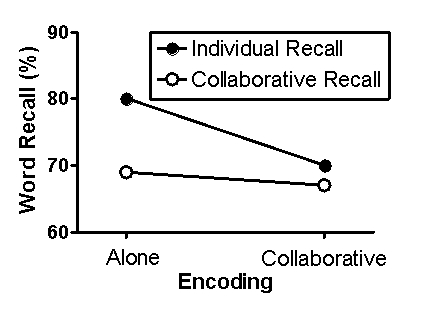Use the following to answer questions
Scenario I
Scenario I is based on and provides fabricated data consistent with the following study:
Barber,S.J. ,Rajaram,S. ,& Fox,E.B.(2012) .Learning and remembering with others: The key role of retrieval in shaping group recall and collective memory.Social Cognition,30(1) ,121-132.doi:10.1521/soco.2012.30.1.121
In a typical experiment on collaborative memory,participants first encode information individually and later attempt to recall the information either individually or in a small group (collaboratively) .While the recall of the collaborative group is better than that of any individual,the summed recall of individuals typically is better than the recall of the collaborative group.This is a phenomenon termed collaborative inhibition.Barber,Rajaram,and Fox (2012) investigated this phenomenon during both the encoding and retrieval stages of memory.
Participants created sentences out of a word bank,which provided for the opportunity to encode this information.After completing this task,participants engaged in an unrelated task-solving mazes-for 10 minutes.Then,in a surprise memory test,they were asked to recall as many words from the word bank as possible (retrieval) .
Participants were randomly assigned to one of four groups.In the first group (Alone-Alone) ,participants were studied individually during both the encoding and retrieval phases of the experiment.In the second group (Alone-Collaborative) ,participants were studied individually during the encoding phase and studied as part of a three-member team (triad) during the retrieval phase.In the third group (Collaborative-Alone) ,participants were studied in a triad during the encoding phase but individually during the retrieval phase.Finally,in the fourth group (Collaborative-Collaborative) ,participants completed both phases of the experiment as part of a triad.
Fabricated results illustrating the major finding of Barber et al.(2012) are presented in Figure 6.1.This figure shows the percentage of words from the word bank accurately recalled as a function of group.For the two groups that experienced the retrieval phase individually,scores represent the summed retrieval of the individuals comprising the group.For the two groups that experienced the retrieval phase as part of a triad,scores simply represent the collaborative performance.
Figure 6.1 
-(Scenario I) If interested only in the effects of individual or collaborative encoding on subsequent retrieval,one should examine the:
Definitions:
Managing People
The practice of leading, organizing, and supporting employees in order to achieve organizational goals.
Behavioral Sciences
Academic disciplines, such as psychology and sociology, that study human behavior through observation and analysis.
Organizational Behavior
The study of how people interact within groups, particularly in a workplace setting.
Intangible Resources
non-physical assets such as brand reputation, trademarks, intellectual property, and skills that a company uses to gain a competitive advantage.
Q36: Collaborative recall typically is better than the
Q50: If a person repeatedly dreams that a
Q77: There are two types of explicit memory,_
Q99: Valium and Xanax are depressant drugs classified
Q208: Joe,a young boy,learns how to make a
Q215: (Scenario I)If subliminal messages truly are effective
Q293: Which person is MOST likely to experience
Q308: A child in grade three must learn
Q368: While walking through the park,Whitney suddenly has
Q406: Shaw and Porter (2015)obtained substantially higher rates